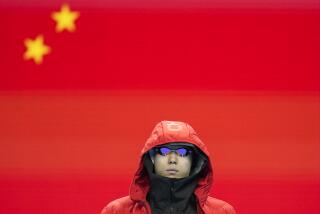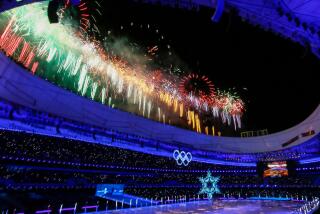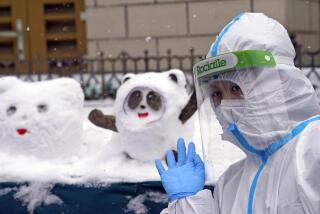Drug Testing Impacts Chinese
- Share via
SYDNEY, Australia — Amid the backdrop of its aggressive campaign to win the 2008 Olympic Games for Beijing, China abruptly withdrew 27 athletes and 13 coaches from its Olympic team Wednesday, saying a stepped-up anti-doping program had turned up “suspicious” results in “several” athletes.
The Chinese Olympic Committee pulled out 14 track and field athletes, four swimmers, seven rowers and two kayakers. The 13 officials include one of the world’s most controversial track coaches, Ma Junren, who has long claimed that his runners won races because they trained at altitude and ate a diet spiced with turtle blood and caterpillar fungus.
International Olympic Committee officials hailed the Chinese move as proof that a new get-tough anti-doping stance is serving as a deterrent to drug use. The policies include thousands of random pre-Games drug tests as well as hundreds of tests--to be instituted for the first time at the Sydney Games--for the performance-enhancing substance EPO, which is believed to be in wide use by world-class athletes.
Knowing of the IOC’s stance, the Chinese performed their own tests beforehand.
“People are now convinced there is a test, that the IOC is prepared to apply it and nobody wants to send athletes to the Games that are going to get caught and disgraced,” said IOC Vice President Dick Pound of Canada, who is also chairman of the recently created World Anti-Doping Agency.
He Zhenliang, China’s member of the ruling IOC Executive Board, did not respond Wednesday night to reporters’ questions as he was being hustled through the lobby of the downtown hotel where the IOC is based for the duration of the Games. They begin Sept. 15 and end Oct. 1.
Asked whether the Chinese pull-out is related to the 2008 bid, Francois Carrard, the IOC’s director general, said, “You should ask them.”
Behind the scenes, it was plain that with the 2008 bid at stake, the Chinese did not want to run the public-relations disaster of having their athletes win gold--only to be stripped upon a positive drug test.
The financial stakes could be immense. The Games would surely open the enormous Chinese market, long hidden from capitalist view, to the world’s biggest multinational corporations--among them the IOC’s leading sponsors.
Seven years ago, Beijing lost out on the 2000 Games to Sydney, by a mere two votes. Already, 2008 Games signs have been hung at the Beijing airport and 2008 Games commemorative stamps have been issues; cabbies and hotel employees in Beijing are being urged to learn English.
The 2008 Games will be awarded next year. Last week, the IOC named Beijing one of five finalists for those Games, along with Istanbul; Osaka, Japan; Paris; and Toronto. Insiders say Beijing is the leading candidate.
“Giving China the Olympics would help foster the Olympic spirit in one-fourth of the world’s population,” Liu Jingmin, Beijing’s vice mayor and executive vice president of the 2008 bid committee, said in a recently published interview.
“The Olympics is the whole world’s. Not yet holding an Olympics in China is one way in which the Olympic movement has fallen short.”
The Chinese announcement about the withdrawal of the athletes and coaches--cutting the Chinese team from 311 athletes to 284--made no reference to the 2008 bid.
The official Xinhua news agency said China had decided to trim its Olympic team for a variety of reasons, including injuries, poor conditioning and “problems” with blood tests.
“For the purpose of their health, and to protect the principles of fair competition, they will not go to Sydney to attend competition this time,” Xinhua said.
The secretary general of the Chinese Olympic Committee, Tu Mingde, told Reuters television that the reasons for the pullout were “simple.”
“The first is that in the course of conducting blood tests we found suspicious results--suspicious--in several athletes,” Tu said. He did not provide numbers or other details.
He added: “Second, some athletes sustained injuries in training and can’t reach their normal levels. Third a few athletes are not well--they have fallen ill. We decided they should not go in order to protect their health.”
Six of coach Ma’s seven runners were on the list of 27.
The only survivor from what has become known in China as “Ma’s Family Army” was Li Ji, according to the list.
Ma’s distance runners burst onto the world scene in 1993, when they shattered world records and won a host of races at the world championships in Stuttgart.
According to news reports, Ma disappeared this week without notice from his training camp on the Tibetan plateau. No reason was given for his dismissal.
A Hong Kong sports medicine professor, Frank Fu, told The Australian newspaper: “Chinese athletes only come under the auspices of the central authorities in the lead-up to major international events, such as the Olympics, spending the four years in between under training with their provincial teams.
“Their loyalty is to the province, not to the nation, and the central authorities can not monitor the activities at provincial level all the time.
“But the central government is now putting its foot down and saying that if you’re not clean, you’re out.”
The two keys to the IOC’s anti-doping stance are the new EPO test and the creation of the World Anti-Doping Agency, which the IOC helped launch last year in the aftermath of the doping scandal at the 1998 Tour de France.
WADA is in the midst of overseeing testing of about half the 10,500 athletes headed for Sydney.
The EPO test, which the IOC approved last week, is a combination of a French urine test and an Australian blood test. The urine test can detect direct use of the drug going back three days; the blood test detects indirect use going back weeks.
The IOC plans to conduct between 300 and 700 EPO tests this month in Sydney. About 20 have been performed already, according to the IOC’s medical director, Patrick Schamasch.
EPO is a “cancer in the sports world,” said He Huixian, a spokeswoman for the Chinese Olympic Committee. The Chinese committee, she said, “resolutely supports the IOC’s stand.”
Observed IOC President Juan Antonio Samaranch: “I am very pleased, very happy. The object is to have clean Games, no?”
*
Times staff writer Henry Chu in Beijing contributed to this story.
*
AGASSI OUT
Defending gold medalist officially pulls out because of concern for his mother and sister, who have breast cancer. Page 8
More to Read
Go beyond the scoreboard
Get the latest on L.A.'s teams in the daily Sports Report newsletter.
You may occasionally receive promotional content from the Los Angeles Times.






